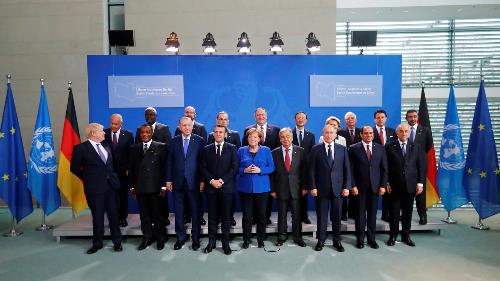Several foreign powers signed a landmark agreement to limit external interference in the war in Libya and to push the country’s warring factions towards a peaceful end to the fighting.
Speaking to journalists after a much-anticipated summit in Berlin, German Chancellor Angela Merkel and UN Secretary-General Antonio Guterres said Sunday’s agreement advances a political process and rules out a military solution to the conflict, which escalated.
“We reached an agreement on a comprehensive plan to support a ceasefire in Libya,” said Merkel, acknowledging the road to peace in Libya would be long and arduous.
“We all agree that we should respect the arms embargo and that the arms embargo should be controlled more strongly than it has been in the past,” added the German leader, though she confirmed potential sanctions for violators were not discussed.
Sunday’s deal marks a new stage in diplomatic attempts towards ending the country’s most recent bout of fighting, which began when renegade military commander Khalifa Haftar‘s eastern-based forces began an assault on the capital, Tripoli last April, leading to more than nine months of fighting in which more than 2,000 people have been killed, according to the United Nations.
Haftar and and his rival, Fayez al-Sarraj, prime minister of Tripoli’s UN-recognized Government of National Accord (GNA), attended but were not participants at the Berlin summit – the first to bring all parties and their backers together.
The two men did not meet directly, with Merkel citing differences of “great magnitude”.
Reports of arms, troops, and cash flooding into Libya from foreign allies in recent months have led to concerns over spiraling violence amid Haftar’s offensive.
“That escalation that was taking place and was becoming extremely dangerous – today there was a strong commitment to stop it,” said Guterres following almost four hours of talks in Berlin.
Even as world leaders convened in Germany, reports emerged of air raids and shelling in Tripoli, in apparent violation of an uneasy ceasefire brokered Turkey and Russia on January 12.
A number of key ports and oilfields in Libya were shut down by forces loyal to Haftar on Sunday and the previous day, obstructing the resource on which Libya’s economy is almost totally reliant, in an apparent bid to ratchet up pressure before the summit.
Leaders and senior officials from Turkey, Russia, Egypt, France, the UK, Italy, the US were all in attendance at the Berlin gathering. Also present were representatives from the UAE, Algeria, China, Republic of Congo, the United Nations, European Union and African Union.
“We commit to refraining from interference in the armed conflict or in the internal affairs of Libya and urge all international actors to do the same,” read a draft declaration of the text to be signed by international leaders.
The 55-point draft communique also called for the disarming of militias, the distribution of oil resources, and progress towards the formation of a single government, and free elections. Committees will be established to monitor the ceasefire and the various commitments made at the summit.
A number of European figures, including British Prime Minister Boris Johnson, German Defense Minister Annegret Kramp-Karrenbauer, and European Union foreign policy chief Joseph Borrell further suggested the possibility of deploying peacekeeping troops to Libya if a permanent ceasefire were agreed, though this was not part of the discussions.
“We should be ready to participate in any kind of efforts in order not to just complain but to be assertive and be part of the solution,” Borrell told reporters.
